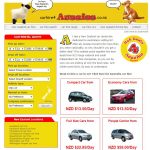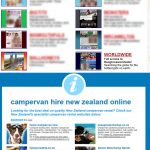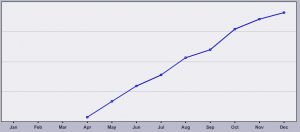With over 200 employees and based in 5 countries around the world, Online Republic can certainly hold its own amongst big New Zealand businesses. Online Republic’s beginnings was humbler, and dangled on the precipice of failure. Despite this, our ragtag company remained both dogged and optimistic about our future. This is the story of how I was swept into that adventure.
“Make your decision now or this offer won’t be available anymore.“

CarHire4Aussies was an early site targeting Australian travellers to NZ. The header of each page featured unique kiwi/aussie banter.
I stammered on the other end of the phone.
That ultimatum forced a choice: a career as a database engineer, or write code for an unproven start-up. The database job was with an established company and job paid more. The other offer came from a internet travel start up by two brothers, Mike and Paul Ballantyne. The start up’s novel strategy was to create travel sites for seniors, families, women, and young travellers. Their emphasis was on design and usability. The interview for this job was amazing experience as we exchanged ideas for nearly 3 hours.
Soon afterwards though, doubt crept whether I should accept this job or go for the job with higher pay.
A day later, after phoned my overseas family (who advised to go to the established company), Mike called. He wanted to know if I was going to take the job. When I told him I had another offer, Mike coolly delivered the ultimatum: “Make your decision now or this offer won’t be available anymore.” So I had to choose from higher paying job using my qualified skills – or venture into uncharted territory with the scrappy start up.
I made my decision. I told Mike I would take the job. [1]
From coder to business partner in 1 month.
My first day was in tiny 7 square meter shared office. At the time there only there 3 people: myself, Mike and Shantala, our designer. I had no desk, but I fashioned a temporary one by stacking yellow page books as supports and an plywood board as the desktop. I was the entire IT team. It was hot, noisy, and chaotic – but I relished every moment of it.
My job was to launch sites quickly and make them look good (though they only coarsely matched our beautiful layouts). I was often introduced as employee #1, but this was untrue. Paul hired a designer first. Both brothers had a keen eye for design and sharp retailing, and were inspired by Steve Jobs. Before we were Online Republic, we were known as iMallbrands [2] – a reference to Apple’s range of i-products.
As for my skill level, my strength was not in Linux or server architecture. I started by buying 20 very cheap cpanel [3] hosting sites for $5 a month, and it was actually cheaper than local dedicated servers at the time. Though it would have been more efficient to set up a central server, my work load had to be managed by what I knew at the time. It was messy and total kludge – however we went live and to market at lightning speed (and even the multiple servers provided a hokey form of redundancy).
Our first sites went live in a little over a month. During that time Paul and Mike saw something in me. They offered me shares in the business. At the time, I no clue of what ‘skin in the game‘ meant. From my experience, you were either a boss or worker. It took time to sink in, but when it did, I was forever grateful for this gift.
Crisis; Crises Averted

The ‘Hub’ Concept was a simple doorway page that led to our different niche sites – the concept was borrowed from the ‘Bang Bros’ network.
Though our car rental business went live quickly, it was not enough to cover costs. The seed money that Mike and Paul initially invested was depleting rapidly. We stopped advertising car rentals in August 2005. We needed a new source of income, and needed it fast.
An insight for a new revenue stream came from one Ryan Posa, who was working for the THL Campervan Rental division. He urged us we needed to get more involved with motorhome rentals. While we dabbled in campervan bookings, we never gave it our full attention. We switched emphasis from car rentals and launched a new range of campervan hire sites.
Another contribution to our success was the creation of a thumbnailed doorway site we call the ‘Hub’. Paul actually got the idea for our Hub from an an erotic site network: it was gateway page to other ‘niche’ sites featuring easy-to-click thumbnail image links. Using a similar strategy, used a gateway site with thumbnails for each travel site we owned. It was an effective strategy in Adwords until they banned doorway pages a few years later.
With our new supply of campers and hub strategy we effortlessly got traction in the Australasian market. Our business grew over 250% from August 2005 to October 2006 off the back of this new division. Incredible high conversion online booking rates were owed to the new established hub strategy.
‘It’s going to be a hugey!‘ became one of our favourite rally cries from Paul came during this time of success. Now we had proof that our ideas worked and we could run a sustainable business.
The aforementioned Ryan Posa was also not forgotten. He was hired to head our cruise division in 2008.
Of Stool Samples and Noobies
Our growth was stymied by our technology. Or more precisely, that I had built it. With more and more bookings coming in, my 8 wired system was barely holding it together. Paul, Mike and I had long conversations about this. Simply stated, it had to be rebuilt.
We put our heads together and designed the ultimate booking system – one that could handle bookings, suppliers, our multitude of websites, reporting, finances – the whole 9 yards. We dubbed the system ‘The Generator‘. It was to be built in-house so we owned the technology. My job was to find the programmer to build it to our exacting conditions.
It was now October – we had a deadline to complete this January 2006. In hindsight, this was a ridiculous completion date. This type of software can take 6 months to a year to build. I scrambled to find someone locally and via international freelancer sites. Finally after 3 weeks, I found someone with a good cv and promised he could deliver the Generator by January 1st 2006.
We waited for what seemed an eternity.
He would only sporadically answer our emails saying he was almost done. Finally we had enough and asked him to turn in what he had. He turned in 15 lines of code on php which was just a list of variables. It was just a few short weeks before Christmas.
We fired him. Mike took his contract and smeared peanut butter on it; the effect made it look like excrement. For laughs, we kept the ‘fecal’ document on our desk for years . Whenever someone did a poor job it became know as getting ‘handed a stool sample‘.
I immediately reviewed the emails I sent to internet freelancers. I gave each programmer a simple task to test their skills. Most didn’t respond. Those who did, worked too slowly or did a poor job. There was communication from a programmer in Russia which I revisited. Responding to my simple task, he wrote:
“This is job for noobie. Write back when you have real job.”
I informed Dmitry Ruban of Moscow that he had a real job now: build The Generator.
120 hour + work weeks and 1000% Growth
January – April 2006 meant 120 hour+ work weeks. Everything was a blur, I have but few memories outside of work. I slept only 3-4 hours a day; filling the remainder with work and caffeine. A friend asked me to shoot a wedding in February, to which I should never have agreed. I overslept the wedding day even though my alarm clock was blaring for 3 hours! Its doubtful I will ever be employed as wedding photographer again.
There was good news however. Dmitry was the real deal. We had reset the due date to mid April. He knew exactly what we were trying to achieve and we all worked relentlessly together to meet that deadline.
Things were getting tight. A we learned about Motorhome rental business, stocks were running out even though demand was high. We needed to get the system live so we could relaunch cars with the hub.
On the evening of Friday, the 14th April The Generator was launched. Car and camper ads went live in Australia, New Zealand, and Ireland. Finally it meant sleep!
I woke to Mike’s call on that Saturday morning. ‘Our bookings are on fire, ol’ son!‘ – we had in fact got more bookings in 1 day than we did for the entire previous month. However, what we didn’t know is that it was Easter, we had all worked so hard that we completely forgot a public holiday was coming up. The result was both boon and bane; we manage to get an abundance of last minute bookings. However, our system had no live availability – which meant that we had to cancel the majority of the bookings!
Despite the cancelled bookings, The Generator proved robust. By June our bookings had grown over 1,000%! We were able to open our markets to North America and Europe that year. Though no system is perfect, the Generator help us scale quickly. Not only did host our internal customer and supplier data, but at one point it controlled over 4000 e-commerce sites around the world.
Not only that, our ad spend caught the eye of Google by growing 4000% from April to June. They reached out to us and put us in touch with some of the smartest people I have ever had the pleasure of working with. Those early years, Google proved valuable collaborators to take our business up to the international level.
Ants Marching and the Gentle Art of Mojo Tampering
Our tiny team gathered more important contributors that year.
In January, Paul had hired Rohan “Marxi” Marx, a local Waikato legend [4], to ramp up our sales. At the time, Rohan worked from Hamilton and commuted to the office one or twice a week. One of my favourite Marxi memories was sharing our tiny offic while the fighting a rampant ant infestation. Nowhere was safe and we had no idea how they travelled up to our 10th floor office. We finally found the source: they were entering and exiting though Marxi’s laptop’s heatsink, having hitched a ride from backwoods of Waikato. We vacated the office for an hour of fumigation.
Later Rohan would became our General Manager and shareholder, his doggedness ensured our business survived during tough times.
Later in 2006, I put out an ad on my personal website [5] looking for a new programmer to join the ranks of Dmitry and myself. I received several applications from around the world but there was one particular one that stood out to me. Sadly, I don’t have the original email anymore – but here is what the opening sentence was to the best of my memory:
“Hi – I don’t want to mess up any of my good mojo but I really want work to for your company. I can program and am skilled at cleaning toilets. “
Hi email had me and everyone in the office in hysterics, so we had to give him a chance. The sender, Matej Drobnic did remote work his farm in Slovenia and eventually moved to New Zealand and became a key component to our success; he became our Chief Technical Officer as well as a shareholder.
He Tangata
When the company company sold in 2016, our fellowship slowly came to an end. Sue, who did so much amazing work behind the scenes left in 2016. Mike gradually reduced his hours and left in 2017. Rohan, Matej and Dmitry have all signaled the end of their tenure in 2018. That leaves Ryan and myself as last stakeholders linked to our origin.
As for myself, I am working remotely one day a week, a difficult compromise so I can live the next chapter of my life in Canada. Before I left, I happened to be in the Vero Centre in downtown Auckland. On ‘wall of words’ I spied familiar quote. Though I’ve seen it many times before, this time it sent a chill through my body:
He aha te mea nui o te ao
He tangata, he tangata, he tangataWhat is the most important thing in the world?
It is the people, it is the people, it is the people
Our founding team came from the far corners of the world, had different cultures and beliefs. If we all met previously, its unlikely that there would be any common interests! Paul instilled the ‘bus factor’ [6] principle to all stakeholders. Though we were valuable, we should never be so indispensable that if we got run over by a bus, the business would collapse. The ultimate proof of concept came after Paul’s terminal cancer diagnosis forced him to step down in the middle of 2010. No longer having our visionary leader at the helm, it forced us to step up . A year after the diagnosis, our business grew over 140%. Sadly, Paul left us in January of 2011, within 6 months of his diagnosis. [7]
We all put aside our differences to make this team work, whole of business became greater than the sum of its parts. Though not without pain, by making ourselves smaller, we empowered our future leaders to shine. In the end it wasn’t a clever idea or piece of technology that made us tick. Our business became bigger than ourselves, allowing for exponential growth that none of us could achieve through our own volition.
Before my flight to Vancouver this year, I walked around our new Auckland office [8]. There were so many people that I didn’t recognise. A friendly face in the kitchen asked me if I was a new person. I returned the smile and nodded as they explained to me that this was the best job they ever had.
In the end, its the people that are most important.
———————-
Footnotes:
- Later on, Mike told me he felt badly about forcing that decision on me. However, I never regretted the push to bring me aboard; I made that decision with my heart instead of my head and it has made all the difference.
- Archive of ImallBrands: Archive.org.
- What is Cpanel?: WPbeginner.com.
- waikatos msu lead singer a millionaire after webjet buys online republic: Stuff.o.nz.
- Talented Programmer Wanted: Vonnagy.com.
- The Bus Factor: Wikipedia
- A Wallet, Some Snappage, and the Northern Lights: OutlierCartel.com.
- Golden age of travel: Online Republic: ArchitectureNow.co.nz
